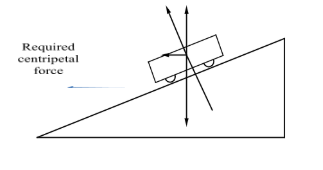Question
Question: A circular railway track of radius r is banked at angle so that a train moving with speed v can safe...
A circular railway track of radius r is banked at angle so that a train moving with speed v can safely go round the track. A student writes: tanθ=v2rg. Why is this relation not correct?
(i) Equality of dimension does not guarantee correctness of the relation
(ii) Dimension correct relation may not be numerically correct
(iii) The relation is dimensionally incorrect.
A.) (i) and (ii)
B.) (ii) and (iii)
C.) (iii) and (i)
D.) (i), (ii) and (iii)
Solution
Hint: In dimensional analysis, the presence or absence of constants, ratios, trigonometric identities cannot be determined. They are dimensionless. That means the dimension is M0L0T0. Therefore adding or removing them does not affect the equation.
Formula used: Centripetal Force : Fc=rmv2 $$$$
Complete step by step solution:
The car moving on a normal road does not experience any forces other than its weight, normal reaction and friction. In this question the frictional force is not considered.
So we have its weight mg acting downwards and its normal reaction N acting upwards.

Car on a banked road with no friction
Here we can see that due to banking of the road the normal reaction is not straight up.
It is normal to the banked road which makes an angle of θ with the horizontal surface.
Taking components of the normal reaction in parallel and perpendicular directions with respect to horizontal surface, we can come to these conclusions that (see fig 2)
(i) The cosθ component of N(normal reaction) balances the weight of the car.
(ii) The sinθ component of N(normal reaction) provides the necessary centripetal force for the car.
Ncosθ=mg
N=cosθm×g
Similarly
Nsinθ=rm×v2
Fcentripetal=rm×v2 (And this is balanced by Nsinθ)
Substituting value of N, we get
rm×v2=(cosθm×g)×sinθ=mgtanθ
mgtanθ=rm×v2
Rearranging, tanθ=rgv2
This shows that even though the equation is dimensionally correct, the answer is wrong.
Therefore (i) and (ii) are the correct options
Note: Unlike other inclined plane problems we took the components of normal in horizontal and vertical direction since the acceleration is along these directions. Usually in inclined problems the components of mass mg are taken parallel and perpendicular to the inclined plane.But here taking components of the normal force in the horizontal and vertical direction makes it simpler to understand.
